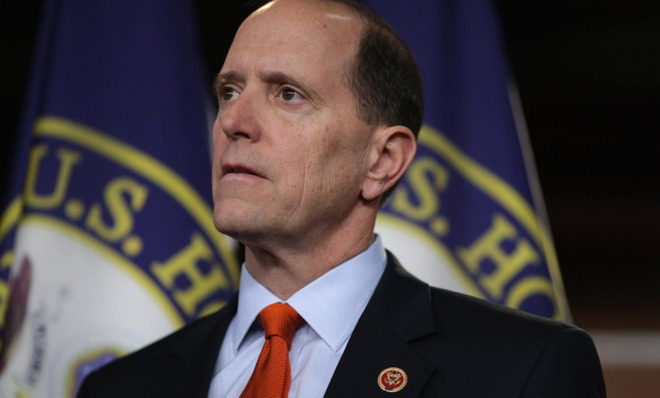Dave Camp's tax plan tells us a lot about the post-Obama GOP
It's a glimpse of a governing vision centered around anti-privilege, pro-competition populism


Since Obama's election, the GOP has been tagged as a party of unremitting obstruction and opposition, with little to offer in terms of substance. But last week Rep. Dave Camp (R-Mich.) stepped out on the political stage and tapped out a major reform of the U.S. tax code.
Because an enormous overhaul of the American tax code creates uncertainty about winners and losers in a reform effort, the bill probably won't be allowed to pass; it is just too easy for Democrats to attack from status-quo bias. The Republicans think all they have to do to prosper in November is run against ObamaCare. And so the plan is being marketed as "Camp's" and not the Republican Tax Plan.
But Camp's tax reform is a flashing signal of what the post-Obama GOP might become. Together with Mike Lee's attempts at policy-rewriting, it seems that Republicans are giving little glimpses about how they might govern again.
The Week
Escape your echo chamber. Get the facts behind the news, plus analysis from multiple perspectives.

Sign up for The Week's Free Newsletters
From our morning news briefing to a weekly Good News Newsletter, get the best of The Week delivered directly to your inbox.
From our morning news briefing to a weekly Good News Newsletter, get the best of The Week delivered directly to your inbox.
In broad outlines, the plan lowers individual tax rates and collapses the code from seven different income brackets to two. More importantly, it lowers the corporate tax rate, which is very high relative to other developed nations. Any lowering of corporate tax rate should have a positive effect on domestic investment. Even without promising to raise revenue, the plan got the normally withering Jonathan Chait to sit up and declare, "It may be the most impressive and ambitious domestic policy proposal crafted by a major Republican in a generation."
But the most intriguing part of the Camp plan is the way it is more solicitous of the material interests of Republican voters, rather than those of the urban rich who actually constitute the Democrats' base of "values voters."
The Camp plan eliminates the federal deduction for state and local taxes. The liberal analysts at Talking Points Memo echoed the complaints of New York Sen. Chuck Schumer about this proposal in a story called: "GOP's new plan hikes taxes on Americans in blue states." But the more provocative and accurate way of titling it might be "GOP plans massive tax hike on the rich." Or those that TPM refers to as "middle-to-upper income people who live in New York and California." As Robertson Williams of the Tax Policy Center admitted, the current deduction that the Camp plan would eliminate is "particularly of value to high income taxpayers for whom deductions are worth more. They're more likely to itemize in the first place, and when they do itemize, the amount they itemize is larger." In other words, Washington has been effectively subsidizing the big-government visions of New York, Massachusetts, and California at the expense of low-tax states. The new reform would eliminate that.
Camp's plan also inspired a similar headline from the Wall Street Journal: "Camp's bank tax shows Wall Street still in doghouse." It's a reference to how Camp's plan would disincentive banks from growing too large, in order to counter the subsidy that currently accrues to banks considered "too big to fail." Banks aren't happy about an extra 3.5 percent quarterly tax on assets, but probably should be happy about the overall cuts to tax liability.
A free daily email with the biggest news stories of the day – and the best features from TheWeek.com
And it isn't just banks. Timothy Carney notes that lots of special interests get their tax-code goodies taken away.
Camp's reform would gore powerful industries by taking away their carve-outs. He would kill the tax credit for electric vehicles (sorry, Tesla), disallow deductions for lobbying (sorry, lobbyists), end special tax treatment for film and television production (sorry, Hollywood), phase out the tax credit for wind and solar generation of electricity (sorry, GE), and kill dozens of other targeted tax breaks. [Washington Examiner]
For too long the GOP has been defined as the party that simply and supinely "helps" business. But the kind of anti-privilege, pro-competition populism embodied by the Camp plan is a good first step toward a new governing vision for the GOP. All that's needed is larger child-tax credits and other measures that can help young people pursue the dream of forming families in stable households. Take those ideas from the Mike Lee tax plan, and the Republican Party will have a lot more to say to voters than "No."
Michael Brendan Dougherty is senior correspondent at TheWeek.com. He is the founder and editor of The Slurve, a newsletter about baseball. His work has appeared in The New York Times Magazine, ESPN Magazine, Slate and The American Conservative.
-
 The best fanfic that got published and went mainstream
The best fanfic that got published and went mainstreamThe Week Recommends Fan fiction websites are a treasure trove of future darlings of publishing
-
 ‘Something close to a universal rallying cry’
‘Something close to a universal rallying cry’Instant Opinion Opinion, comment and editorials of the day
-
 Trump sues IRS for $10B over tax record leaks
Trump sues IRS for $10B over tax record leaksSpeed Read The president is claiming ‘reputational and financial harm’ from leaks of his tax information between 2018 and 2020
-
 The billionaires’ wealth tax: a catastrophe for California?
The billionaires’ wealth tax: a catastrophe for California?Talking Point Peter Thiel and Larry Page preparing to change state residency
-
 Bari Weiss’ ‘60 Minutes’ scandal is about more than one report
Bari Weiss’ ‘60 Minutes’ scandal is about more than one reportIN THE SPOTLIGHT By blocking an approved segment on a controversial prison holding US deportees in El Salvador, the editor-in-chief of CBS News has become the main story
-
 Has Zohran Mamdani shown the Democrats how to win again?
Has Zohran Mamdani shown the Democrats how to win again?Today’s Big Question New York City mayoral election touted as victory for left-wing populists but moderate centrist wins elsewhere present more complex path for Democratic Party
-
 Millions turn out for anti-Trump ‘No Kings’ rallies
Millions turn out for anti-Trump ‘No Kings’ ralliesSpeed Read An estimated 7 million people participated, 2 million more than at the first ‘No Kings’ protest in June
-
 Ghislaine Maxwell: angling for a Trump pardon
Ghislaine Maxwell: angling for a Trump pardonTalking Point Convicted sex trafficker's testimony could shed new light on president's links to Jeffrey Epstein
-
 The last words and final moments of 40 presidents
The last words and final moments of 40 presidentsThe Explainer Some are eloquent quotes worthy of the holders of the highest office in the nation, and others... aren't
-
 The JFK files: the truth at last?
The JFK files: the truth at last?In The Spotlight More than 64,000 previously classified documents relating the 1963 assassination of John F. Kennedy have been released by the Trump administration
-
 'Seriously, not literally': how should the world take Donald Trump?
'Seriously, not literally': how should the world take Donald Trump?Today's big question White House rhetoric and reality look likely to become increasingly blurred
